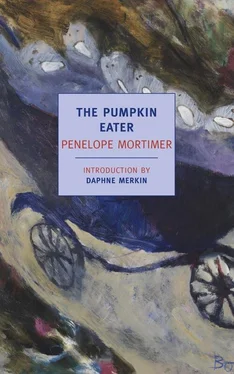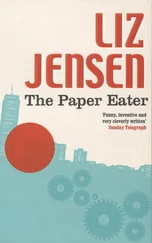At last, lingeringly, with sad backward glances at the glorious day, they went. They could well look after themselves, but because I had been away I went about picking up socks, opening windows, telling them to hurry, tucking them in. Encouraged, they clung to my hand, each jealous of another, demanding to know about death and sex and other subjects which they hoped might interest me. When one of them pestered unduly, another would demand that I was left alone; when one of them called for me to go back and listen, another said crushingly, “You are a beast, can’t you see she’s tired.” By the time I left Dinah, dazed by the possibility of a Supreme Being, my longing to be alone with Jake had cooled and hardened into a longing to forget, to postpone, to sleep.
“I suppose you’re tired,” he said, the first words he had spoken directly to me for nearly two weeks.
“Yes. I am.” I sat down, kicking off my shoes, stretching my toes. Under cover of this nonchalant gesture I looked at Jake. He, feeling it, looked at me. We both turned to the fire, as though to a third person.
“You look terribly tired,” I said.
“I am.”
“You look … awful.”
“I feel awful.”
There was another silence. How many nights had we sat in this room testing, probing, waiting for the moment to strike? A year of nights, between Philpot and now? No, more than that. We were both nine years older, nine years more cunning, nine years more dependent.
“I’m sorry,” I said. “I know you’re upset. I know you don’t want this baby.”
“Do you?” A look of such hope struck his face that he sat blinking, as though puzzled with it. In fact, I had not known. Perhaps I had even thought that by some miracle he might by now be glad. I found that I was kneeling to him, holding his limp hands. “I’m sorry. Darling, darling Jake, I’m sorry …”
He said nothing.
I said, “I know just how it feels to have got someone into trouble. This must be just how it feels. I’ve got you into trouble, haven’t I?”
“It can’t be helped.”
The weight of resignation in his voice made me desperate. If he had shouted, hit me, I could have fought back. But he was shutting me out, retreating into lethargy.
“It’ll be all right,” I said. “I promise you. You’ll like it when it’s born, you always do, perhaps it’ll be a boy, you haven’t got anything like enough boys, you haven’t got as many as Giles even. One more won’t make any difference, I promise you it won’t. We’ll have the tower ready and we’ll spend the summer there. When we’ve got the tower we can spread out a bit, can’t we, and you really won’t notice it, Jake, I promise you …”
“All right,” he said. “It doesn’t matter.”
“But it does matter! I can’t have a baby you don’t want!”
He looked at me sadly. He had gone. Something had stopped in him. “You should have thought of that before,” he said, and almost smiled.
“You mean, you don’t … you really don’t want it?”
“No.”
I knelt upright, humiliated by touching him. I got clumsily to my feet. I stood with my back to him, looking vaguely round the familiar room, the walls, maps of the time we had spent together, pictures, objects, things.
“What… do you want, then?”
“It hardly matters, does it?”
“Oh. I see.”
By now I was used to fear. It no longer bewildered me as it had done the night Philpot left. Pounding heart, dry mouth, trembling, not a thought in my head but save me. But while it came and grew and I suffered it I knew that I was not at all afraid of what he had said; I was afraid of the reason for his saying it.
“Why?”
He hesitated.
“Don’t work it out,” I said. “Just tell me why.”
“Because I don’t want it. That’s why.”
“Yes. I see.”
The silences were the silences of a blackout in which actors run softly to take up new positions; they were longer than the tableaux in between, in each of which we were doing the same thing, but in different attitudes. I turned and faced him. “But… why ?”
He sighed, looking at me. I suppose I looked absurd, shoeless, ravaged, demanding my answer with stiff hands. He patted the arm of his chair. “Come here.”
“No.”
“I want to tell you the truth.”
“Then tell me the truth.”
“But come here.”
I went slowly. After a moment he began to stroke my hair as though I were a dog who had to be calmed.
He starts by saying that he is not a good person, like I am, but he doesn’t say what he means by good. He says that he is weak, impatient and not to be trusted. He has done his best in the past, but even then he has failed me, dismally failed me. Does he believe this? Why this sudden humility? I want to believe it. I want to shut my eyes and be lapped by lies. Jake is humble.
He knows what’s wrong with me. He’s given me all the wrong things. Material things. He’s neglected me. Perhaps this is true. He has never spoken like this before: rather too solemn, a bit pompous. He feels about this. He means it. Jake is trying to say something he means. Because of this short-sightedness of his, I came to feel my life was pointless and empty. Quite rightly. So it was. I was perfectly right to feel like that. And since he was no help to me, I took the only way out that I knew: I decided to have another child.
He is not blaming me. Jake is blaming himself. (Is he saying I didn’t know any better? Well, if he is, it’s true.) His first reaction was that he had been cheated. This, he says, is why he behaved so badly at the cremation. Then, after seeing me there, he began to think. Jake began to think. He thought it out and he realized that it was he who had cheated me. He had left me in a vacuum and I had simply grabbed what I could get, the only thing I could think of to make me happy again.
All right. All right, Jake. Go on. The fear is eased, the fire is warm, love is simple. Somebody is explaining things to me, understanding me. I’m resting now. I’ll believe anything.
He isn’t excusing himself, but he’s been terrified by the task of supporting us all. For years he’s been driven on by panic, taking on ghastly scripts he didn’t want to do, accepting everything he was offered; destroying, incidentally, his own talent in the process, but that doesn’t matter, the point is that he’s kept us, we’ve come out of it alive. But the irony, the bloody irony of it is that just at this point when he has realized how much he loves me, when we could for the first time start planning a happier, more sensible life, just at the point when we could start thinking of a little freedom — I’m pregnant again. The whole thing starts all over. Instead of love and a good time — he doesn’t of course mean a good time , he means a good time — and being able to go away together and see a bit of the world, broaden our horizons, enjoy what he supposes is our middle age — instead of all this, another child. To him, it’s tragic. We could have lived so differently. But now … it’s tragic.
Now he’s stopped talking. The caves of the fire blaze with icicles, stalactites seen through tears. I don’t speak, because he has something left to say.
Of course he knows, good God he knows , that the idea of abortion is repellent to me. It is to him, too. He would never dream of suggesting it. I must agree that he never has. It’s only that the doctor, that psyche, did say that I shouldn’t have another child. I’m in the middle of treatment, Jake says, for depression. An abortion would be perfectly legal. It wouldn’t be underhand, nasty, anything like that. Still, he supposes that the only thing to do is to take the risk and have the baby and get down to work again. They want him to go to Hollywood for six months. He was going to turn it down, take the summer off. He had wanted to get to know the children again, he says; he wanted to take them out and dust them and polish up their faces. Now … oh well, that’s life. Don’t be upset, darling. Don’t cry. I want to make you happy. Good God, after all, he’s got me into this. All those boring months, the pain at the end. He only wishes he could get me out of it while there’s still time.
Читать дальше












